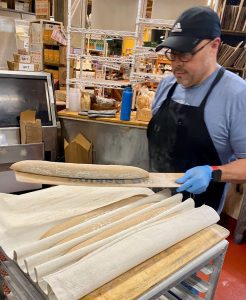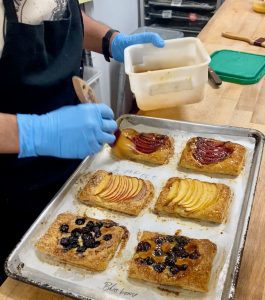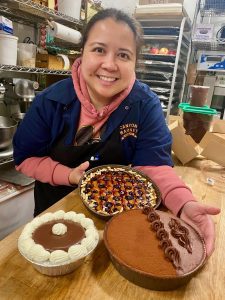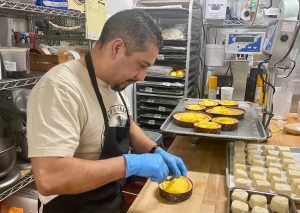(Steiman retired in 2019 after 35 years as an editor and writer at Wine Spectator magazine. Prior to that he was food and wine editor at the San Francisco Examiner and hosted daily radio programs on food on KCBS and KNBR. He lives in Glen Park.)
Photos: Harvey Steiman
Glen Park is asleep at 3am. The corner of Wilder and Diamond streets, bustling by day, is quiet. The air is cool. Inside Canyon Market the lights are off in the freezer aisle, shelves of groceries are in the dark, and the deli is deserted. All is still except for a few busy souls, baking.
Since the store debuted in 2006, a good part of its charm rests on fresh breads and pastries baked in-house. This is something few independent groceries do. Gus’s, the family-owned group of neighborhood grocery stores that purchased Canyon Market less than two years ago, does no baking of its own in its four other San Francisco stores, but luckily for us Gus’s decided to keep the loaves and pastries coming at Canyon Market.The grocery aisles offer plenty of commercially packaged cookies, breads, bagels and other goodies. But it’s the stuff that’s made in-house that add to the store’s aroma. Especially mid-morning, when the baking of French baguettes often draws a small crowd.
It’s a scene a few feet from the checkout lines when bread baker Felipe Sotero III artfully rolls long, thin cylinders of dough from their canvas-wrapped rise and slides them into the four-tier oven. As they bake Sotero sprays plenty of water over and around the loaves. This helps them attain their crystal-like crust in the few minutes it takes them to bake through.
Aside from the baguettes, other loaves emerge from the big oven in the hours before the store opens at 7am—sourdough bâtards, sandwich breads, ciabatta, focaccia among them. Since 3am Sotero has been trolleying the risen dough from the proofing box in the back kitchen to the oven for one 15- to 25-minute bake after another.

Once the finished loaves have cooled, he puts most of them into paper bags to stack on racks for shoppers to purchase. Sandwich breads are baked into long loaves and sliced for the deli. Shorter loaves are sliced and bagged in transparent bags for shoppers. The deli also gets some of the ciabatta and focaccia. Some of the herb-infused focaccia is cut into squares. A few of them are cubed by hand to be toasted into croutons for the salad and soup bar.
The bakery would not make financial sense if it only sold breads and pastries one at a time, as a neighborhood bakery might. What pays off is supplying the deli with a key ingredient (and makes sandwiches better than they might be with purchased loaves). And offering fresh cakes, cookies and pastries on shelves at the coffee bar, supplemented with more options from Glen Park’s other excellent producer of tasty oven treats, Destination Baking Company, around the corner on Chenery Street.

Inside the Bakery
Big sacks of Giustos flour are stacked shoulder high at the edge of a small baking kitchen hidden behind the butcher’s area next to the deli. A sourdough starter, nurtured in the store since 2006, rests quietly in a round plastic tub that lives on a lower shelf. A separate morning shift of the bread crew begins the next day’s breads later in the morning by mixing doughs from five varieties— sourdough, white, whole wheat, multigrain, and rye.
The first step is to make a sponge, a sort of wet batter that rests for several hours before the bakers add different amounts of flour for various breads. Then the dough is shaped and allowed to rise again overnight in a proofing box that occupies a corner of the kitchen.
The small kitchen is where bakery supervisor Michelle Cabrera, a trained pastry chef, leads a small crew that produces cookies, scones, fruit pastries, cakes, biscuits and sweet breads on a table that might fit in a home dining room. A Filipino-born mother of three, Cabrera grew up watching Cooking Channel shows. Both her parents worked for Meals on Wheels and her father was the head cook.

She showed a talent for pastry when she was a student in the patisserie and baking program in California Culinary Academy of Le Cordon Bleu, where she won first prize for a wedding cake in a baking competition. “People respond to what they see before they eat it,” she shrugs, and she remains a stickler for making the pastries look tempting.
Her résumé includes a certificate from Cordon Bleu in San Francisco and stints as a pastry cook at Farallon (her first fine dining job) and pastry chef at Dirty Water, the upscale food service at the former Twitter building. When she got an email from Canyon Market asking if she might be interested in a job as a pastry maker, she applied, was hired in early 2019, and rose to bakery supervisor in 2022.
Sotero, an artist by trade, moved to San Francisco to manage a store for a jewelry company he had been working for back east. When the new satellite store closed after eight months, he worked in construction before landing a job at Canyon Market in 2018 assisting the bread baker. Now he’s the No. 1 bread guy, and relishes the early mornings so he can pursue his own big canvases and murals during the day.
While Sotero is busy baking bread, Guillermo Zuniga (who goes by “Memo”) is forming cookies and scones, glazing fruit pastries, filling tarts and making coffee cakes at the pastry table. He stacks the trays on rolling carts and shuttles them to a convection oven just outside the kitchen door. The process continues nonstop until the deli department arrives.
“I actually started as a butcher here,” says Zuniga, who cooked in several upscale Mexican restaurants and worked in a seafood store before arriving at Canyon Market in 2020. “I started in the deli making sandwiches, and then mixing bread. Before that I did not know what flour was.” Now he turns out gem-like pastries that tempt shoppers getting a coffee or perusing the refrigerated case of cream tarts and puddings.

How It All Started
Janet and Richard Tarlov, who founded Canyon Market, both worked at Oakville Grocery’s Stanford Shopping Center store in the 1990s. Richard was consulting with Oakville at the same time he was delivering Androuët cheeses to stores across the Bay Area, and eventually managed the store full-time. Janet was hired around the same time. “It was was a pretty quiet store, but she basically turned it around,” Richard says.
Josh Allen, the founder of Companion Baking in St. Louis came to Stanford in 2001 to start a small café and in-house bakery at Oakville. The Tarlovs saw how it contributed to the store’s success there. Then they learned that the building replacing the one that housed Diamond Supermarket, before it burned down in 1998, would include space for a new grocery store. They jumped at the chance and signed a lease. They also sought out Allen, whose St. Louis bakery was booming, and he bought into the Glen Park investment.
An in-house bakery was not in the plans at first. Over cups of mint tea on a recent afternoon at an outdoor table outside the Glen Park store, Richard explains: “We didn’t think we needed it, but we were suckers for Josh’s ideas. A small bakery doesn’t work as a stand-alone investment, but Josh knew how to create a diversity of products for a small store like ours.”
Allen was a bread expert. Needing a pastry guru, Janet called on her friend Patrick DeLessio, whose family owned a bakery and small grocery on Market Street (now closed). “He did not want to bake any more,” Richard says. “He wanted to do marketing, and we found he was a genius at that. But all our pastry recipes were his (and mostly still are, Cabrera confirms).
“He was a great teacher, and he knew how to get maximum mileage out of one batch of buttercream.”
From the beginning the Tarlovs also connected with Destination Bakery to supply items, such as croissants, muffins and other specialties beyond the already extensive capabilities of their modest in-house bakery.
Baking their own sandwich loaves and focaccia and filling the pastry cabinet at the coffee bar with their own production and Destination’s made the financial equations add up. And then there’s the effect of temptation on shoppers. “How do you put a number on how all this makes the store special?” Tarlov asks. “It brings people in, and keeps them coming back.”
To a large extent, Janet’s experience and Allen’s inventiveness in the Stanford Oakville Grocery built the foundation for the Glen Park business. “There’s a lot of Oakville DNA in Canyon Market,” Richard admits.
Cabrera, the baking manager, admits that she and the baking staff worried about the baking department’s future when Gus’s bought the business. But, she says, the new owners told her, “Keep doing what you’re doing.” And so they are.